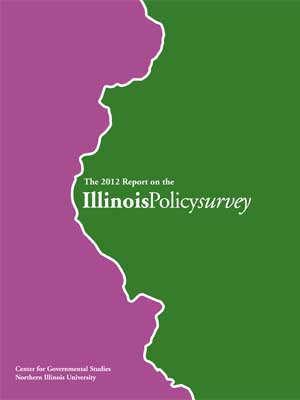 Residents of Illinois in 2011 worried about paying their mortgages and keeping their jobs, and had few good things to say about lawmakers.
Residents of Illinois in 2011 worried about paying their mortgages and keeping their jobs, and had few good things to say about lawmakers.
Those findings were among the results of the 28th annual Illinois Policy Survey published last week.
Conducted annually each fall, the survey is designed to provide citizens and state leaders with systematic and representative information on public attitudes, values and expectations regarding the performance of elected officials and policy issues facing Illinois.
“Facing their own financial challenges in a weak economy that has grown ever so slowly since the economic collapse of 2008, the people of Illinois seem impatient with their elected officials,” said Mikel Wyckoff, assistant chair of the Department of Political Science at Northern Illinois University.
Wyckoff, along with Professor Barbara Burrell, oversaw this year’s survey.
“Respondents grudgingly give credit for certain steps taken to help resolve the state’s economic crisis,” Wyckoff said, “but in the main they were dissatisfied with the results that have been achieved, and most give lawmakers low marks for their performance in office.”
Among the highlights of this year’s survey:
- Personal Finances Shaky: Only 13 percent said that they were better off than the year before (essentially the same as last year), while 34 percent reported being worse off (up five points from last year). One-third of respondents said that they were at least somewhat concerned about becoming unemployed this year (11 percent of respondents were unemployed at the time they took the survey), and 44 percent were at least moderately worried about being able to pay their mortgage or rent. A slim majority (55 percent) said that they would be better off financially four years from now.
- Satisfaction Low: Only 12 percent said that they were satisfied with the way things were going in Illinois, while 67 percent were dissatisfied.
- What’s to blame for state’s fiscal problems: When asked to rate how much various factors were “a great deal” to blame for the state’s fiscal woes, 74 percent said excessive government spending in Springfield, while 46 percent gave that level of blame to excessive borrowing. Nearly 60 percent felt that the sluggish national economy was a significant factor.
- How well has the state handled money problems: Respondents clearly laid a blame for the state’s economic problems at the feet of state lawmakers, with 76 percent giving them a rating of fair, at best.
- Dissatisfied with lawmakers: Politicians across the board got negative ratings. More than 50 percent gave state lawmakers a rating of poor or very poor, and more than 60 percent gave the same marks to Congress.
- Credit for progress made: While respondents were down on lawmakers in general, they did give them credit for making progress on reducing spending (56 percent very good or good); reducing the backlog of bills (63 percent very good/good); meeting this year’s pension obligation without borrowing (89 percent very good/good).
- No new taxes – almost: One solution they did not like was the tax increase approved last year. Nearly 60 percent favored a repeal of the higher income tax rate, but only 40 percent favored a repeal of the higher corporate rate. The idea of any new taxes going forward was also wildly unpopular – only 7 percent favored raising sales taxes, 6 percent supported a tax on services. More popular were broadening legalized gambling (29 percent) and higher taxes on tobacco and liquor (42 percent.)
- Fight the power: Even less popular than raising taxes was the General Assembly’s vote to allow power companies to raise rates in order to fund upgrades to the state’s electrical grid. Only 25 percent supported that decision.
The telephone survey was conducted in November and December of 2011, and is based upon a sample size of 1,221 respondents, which provides a confidence interval of +/- 3 percent.
